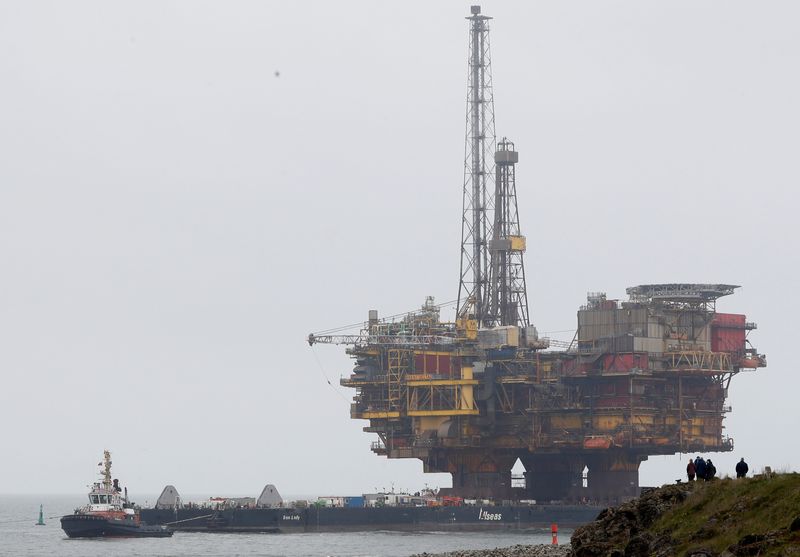
© Reuters. FILE PHOTO: Shell’s Brent Delta oil platform is towed into Hartlepool, Britain May 2, 2017. REUTERS/Darren Staples
2/2
By Ron Bousso and Sabrina Valle
LONDON (Reuters) -A group of investors has tabled resolutions urging four of the world’s top oil and gas companies to set broad climate targets for 2030, reviving pressure on the sector after a year that saw governments shift their focus to energy security.
Activist group Follow This said it had co-filed the resolutions with six major institutional investors managing $1.3 trillion in assets ahead of the annual general meetings of BP (NYSE:), Chevron (NYSE:), Exxon Mobil (NYSE:) and Shell (LON:) next year.
In the resolutions, the investors call on the companies to set targets to reduce by 2030 greenhouse gas emissions including those from fuel sold to customers, known as Scope 3 emissions, which account for the vast majority of the sector’s pollution.
Investors have in recent years ramped up pressure on the oil and gas sector to help tackle climate change, and the Follow This climate-related resolutions have drawn growing support among shareholders.
However, last year the efforts largely sputtered as investors turned their focus more to higher energy prices and energy security following Russia’s invasion of Ukraine.
BP, Shell and Chevron have all set some 2030 greenhouse emissions reduction targets that include Scope 3, though Follow This said they are not aligned with the United Nations’ ambitions to limit global warming to 1.5 degrees Celsius above pre-industrial levels.
Exxon, which does not have Scope 3 targets, has said the way they are calculated is flawed. The methodology has the unintended consequence of passing carbon footprint to someone else, it says – for example, when companies are punished for producing more that would replace coal, a more polluting fuel.
Chevron said it values input from shareholders and will evaluate any proposal received.
BP did not respond to requests for comment.
Shell said it believed its targets are aligned with the U.N. climate targets.
“Follow This has consistently proposed shareholder resolutions that are simplistic, unrealistic and against the best interests of Shell. We remain committed to constructive engagement with our investors,” a Shell spokesperson said.
The group of investors co-filing the resolutions includes Edmond de Rothschild Asset Management, Degroof Petercam Asset Management and Achmea Asset Management. Follow This did not provide the names of the other backers.
“We recognize Shell has made tremendous improvement in its climate targets. Nevertheless, it still lacks an absolute 2030 (emission reduction) target,” Jean-Philippe Desmartin, head of Responsible Investment at Edmond de Rothschild Asset Management told Reuters.
Shell, BP and European peers including TotalEnergies and Eni have set out strategies and targets to slash emissions to net-zero by 2050 by reducing oil and gas output and growing low-carbon and renewable energy businesses.
“The focus on Scope 3 by 2030 leaves the oil majors no wiggle room for smokescreens about ‘net zero emissions by 2050’,” Follow This founder Mark van Baal said.
In the United States, 2022 saw a wave of efforts driven by Republican politicians and right-leaning investors to focus executives’ attention away from environmental, social or governance (ESG) themes.
Activist investor Strive Asset Management, for instance, is seeking a shareholder vote at the springtime meeting of Chevron to reverse a Scope 3 emissions reduction mandate.
Exxon and Chevron have in the past successfully blocked attempts to file climate resolutions with the Securities and Exchange Commission.